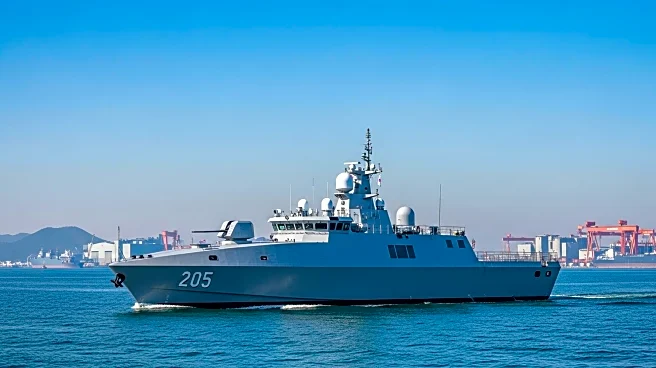What's Happening?
South Korea's shipbuilding industry is making significant strides to bolster U.S. maritime security through substantial investments and strategic mergers. Hanwha Group, a major South Korean conglomerate, has announced a $5 billion investment in the Hanwha Philly Shipyard, which it acquired last December. This investment will expand the shipyard's capacity from producing two vessels to at least 20 per year, including LNG carriers and naval modules, with plans to eventually manufacture U.S. naval vessels. South Korean President Lee Jae Myung attended the announcement in Philadelphia, emphasizing the industry's commitment to strengthening U.S. maritime capabilities. Additionally, HD Hyundai, another South Korean shipbuilding leader, has merged its facilities to enhance production capabilities and foster cooperation with the United States.
Why It's Important?
The investment by South Korean shipbuilding companies is poised to significantly impact U.S. maritime security and shipbuilding industry. As the U.S. aims to expand its maritime power amidst growing geopolitical tensions, particularly with China, the involvement of South Korean manufacturers offers a strategic advantage. This collaboration is expected to create numerous jobs, benefiting the U.S. workforce and contributing to the modernization of American shipbuilding facilities. The initiative underscores the importance of international partnerships in enhancing national security and economic growth, with South Korea's advanced shipbuilding technology playing a crucial role.
What's Next?
The next steps involve the implementation of the announced investments and mergers, with Hanwha Philly Shipyard set to commence its efforts to overhaul and modernize its facilities. This will include the installation of new docks and quays, and the construction of a new assembly facility. The expansion of production capabilities is expected to foster a skilled workforce in the U.S., with Hanwha committed to being a long-term partner in American shipbuilding. Stakeholders, including U.S. maritime authorities and industry leaders, will likely monitor the progress and outcomes of these developments closely.
Beyond the Headlines
The collaboration between South Korean and U.S. shipbuilding industries may have broader implications for international trade and defense strategies. It highlights the role of technological innovation and global partnerships in addressing security challenges. The initiative could also influence other sectors, such as logistics and transportation, by enhancing maritime infrastructure and capabilities. Furthermore, it may set a precedent for future international investments in U.S. industries, promoting economic growth and technological advancement.









